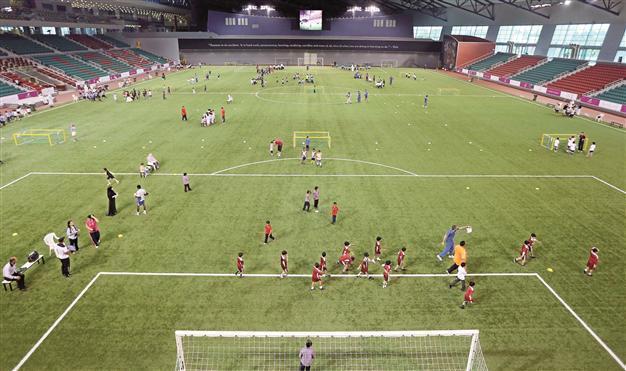Qatar’s sports-focused public diplomacy policies backfiring
James M. DORSEY

International organizations such as FIFA, are watching the Qatari government’s efforts to improve working and living conditions of workers in the country closely. AFP photo
A perceived lack of real progress in the improvement of conditions for foreign labor, aggravated by a Qatari reluctance to engage in public debate beyond platitudes, is undermining the soft-power goals underlying the Gulf state’s sports strategy.
The silver lining in the public relations beating Qatar is taking is that it forces international sports associations like FIFA, the world’s governing football body, to include issues of labor and other rights in their policy toward hosts of mega events like the 2022 World Cup. That was already evident last year when the International Olympics Committee (IOC) rejected Qatar’s bid to host the 2020 Olympics, in part, according to labor activists, because of workers’ material conditions.
FIFA, in its latest response to persistent media reporting on onerous living and working conditions of foreign workers who constitute a majority of the Gulf state’s population and are building vast infrastructure projects, demanded this week that Qatar report on its progress to improve living and working circumstances.
FIFA, whose executive committee is expected to take up the issue on March 20, needs to demonstrate that Qatar is making good on pledges to improve workers’ conditions and living up to lofty words contained in a series of statements and charters.
“FIFA expects to receive information on the specific steps that Qatar has taken since FIFA President [Sepp] Blatter’s last trip to Doha in November 2013 to improve the welfare and living conditions of migrant workers,” FIFA said in a statement.
In response to a three-year-old campaign by the International Trade Union Confederation (ITUC) and human rights groups, as well as media reporting spearheaded by Britain’s The Guardian, Qatar has pledged to increase the number of inspectors overseeing the implementation of existing rules and regulations. These provisions are widely viewed as meeting international standards despite widespread criticism of the kafala or sponsorship system that significantly restricts workers’ freedom of movement and ability to change jobs.
Qatar has also drafted a number of charters of workers’ rights, the most ambitious of which is that of the Qatar Foundation that, according to people involved in its drafting, seeks to structurally alter a laborer’s migration cycle, which involves corrupt middlemen and company human resource officers. The problem is the foundation has not widely published the charter nor reported on progress it has made in making the migration cycle less onerous.
FIFA’s request for a progress reports follows a report in The Guardian’s Sunday paper, The Observer, according to which 185 Nepalese construction workers died last year as a result of onerous labor conditions. That would bring the number of reported Nepalese deaths over the last two years to 382. Trade unionists have focused on the Nepalese community because it accounts for up to one-quarter of Qatar’s 2 million inhabitants. Nepalese rank among the lowest-paid workers in Qatar.
“We are currently in the middle of an intensive process, which is exclusively aimed at improving the situation of workers in Qatar. Ultimately, what we need are clear rules and steps that
will build trust and ensure that the situation, which is unacceptable at the moment, improves in a sustainable manner,” Theo Zwanziger, a FIFA executive, said in a statement.
The public relations beating of Qatar stems from the Gulf state’s apparent inability to draw conclusions from a failed communications strategy ever since winning its World Cup bid. Qatar failed initially to anticipate the criticism of its success driven by questions about the integrity of its bid as well as envy and jealously by those who had unsuccessfully competed against it. It subsequently surrendered the public relations battlefields to its detractors by deciding not to engage in the false hope that criticism would eventually subside.
Efforts continueThe result is not only that Qatar is on the defensive but that it has lost significant ground in achieving a core goal of its vast investment in sports in general and football in particular: the projection of soft power in a bid to compensate for a lack of hard power. Soft power is a key Qatari defense and security strategy based on the realization that it will never have the military strength to defend itself irrespective of what hardware it acquires or the number of foreigners it recruits to populate its armed forces.
Sports is central to a soft-power strategy designed to embed and endear Qatar in an international community in ways that would ensure that the world would come to its aid in times of need much like a U.S.-led force expelled Iraqi occupation troops from Kuwait in 1990. Qatar has so far missed the plank with international public opinion associating it more with modern-day slavery than with being a cutting-edge, 21st century nation that is contributing to the global good.
In an apparent decision to take more control of preparations of the World Cup, Qatar’s 33-year-old emir, Sheikh Tamim Bin Hamid al-Thani, a sports enthusiast and member of the IOC executive committee, downgraded the Supreme Committee that had so far been in charge of organizing the World Cup and created a new body chaired by himself and populated by his appointees to oversee event and operational planning as well as coordination with FIFA.
